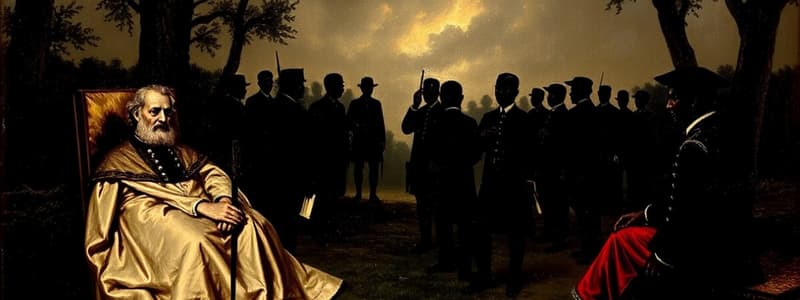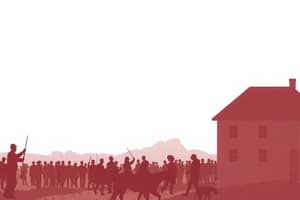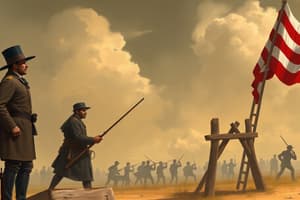Podcast
Questions and Answers
What was the primary purpose of Harriet Beecher Stowe's novel 'Uncle Tom's Cabin'?
What was the primary purpose of Harriet Beecher Stowe's novel 'Uncle Tom's Cabin'?
- To evoke empathy and moral outrage against slavery. (correct)
- To highlight the contributions of enslaved people to American culture.
- To serve as a historical account of the American Civil War.
- To promote the plantation economy in the South.
How did John Brown's actions at Harper's Ferry impact the abolitionist movement?
How did John Brown's actions at Harper's Ferry impact the abolitionist movement?
- They had no significant effect on the ongoing debates about slavery.
- They shocked abolitionists and intensified the North's resolve against slavery. (correct)
- They resulted in widespread support for the pro-slavery side.
- They led to significant legislative changes in favor of slavery.
Which of the following best describes John Brown's motivations for fighting against slavery?
Which of the following best describes John Brown's motivations for fighting against slavery?
- He aimed to become a political leader in the aftermath of the Civil War.
- He wanted to establish a new settlement for freed enslaved people.
- He sought personal wealth through abolitionist movements.
- He was motivated by a childhood incident that instilled a strong aversion to slavery. (correct)
What was the significance of the Kansas-Nebraska Act of 1854 in relation to John Brown?
What was the significance of the Kansas-Nebraska Act of 1854 in relation to John Brown?
Why did Southern states choose to secede from the Union?
Why did Southern states choose to secede from the Union?
What was the primary mechanism through which the Kansas-Nebraska Act allowed decisions on slavery to be made?
What was the primary mechanism through which the Kansas-Nebraska Act allowed decisions on slavery to be made?
Which territories were involved in the Kansas-Nebraska Act?
Which territories were involved in the Kansas-Nebraska Act?
What was a significant consequence of the Kansas-Nebraska Act known as 'Bleeding Kansas'?
What was a significant consequence of the Kansas-Nebraska Act known as 'Bleeding Kansas'?
How did the Supreme Court's past rulings affect expectations regarding Dred Scott's case?
How did the Supreme Court's past rulings affect expectations regarding Dred Scott's case?
What strategy did Frederick Douglass employ to convince Americans to support the abolition of slavery?
What strategy did Frederick Douglass employ to convince Americans to support the abolition of slavery?
What was a primary consequence of the Fugitive Slave Act on Northern society?
What was a primary consequence of the Fugitive Slave Act on Northern society?
Which of the following correctly describes the provisions of the Missouri Compromise?
Which of the following correctly describes the provisions of the Missouri Compromise?
What motivated many Northerners to oppose the Fugitive Slave Law?
What motivated many Northerners to oppose the Fugitive Slave Law?
Which statement accurately reflects Henry Clay's position on slavery?
Which statement accurately reflects Henry Clay's position on slavery?
What did the concept of popular sovereignty entail in the context of Utah and New Mexico?
What did the concept of popular sovereignty entail in the context of Utah and New Mexico?
Flashcards
Compromise of 1850
Compromise of 1850
The Compromise of 1850 allowed California to enter the Union as a free state but also included the Fugitive Slave Act, requiring the return of escaped slaves to their owners, even in free states. This temporarily eased tensions but fueled the debate over slavery, ultimately contributing to the Civil War.
Fugitive Slave Act
Fugitive Slave Act
The Fugitive Slave Act required citizens in free states to assist in the capture and return of escaped slaves. This angered many Northerners and abolitionists who opposed slavery. The law made it difficult for escaped slaves to find freedom and contributed to tensions between the North and South, ultimately fueling the Civil War.
Popular Sovereignty
Popular Sovereignty
Popular sovereignty allowed residents of a territory to vote on whether or not to allow slavery within their borders. This applied to Utah and New Mexico, giving them the power to decide their future regarding slavery.
Missouri Compromise (1820)
Missouri Compromise (1820)
Signup and view all the flashcards
Impact of the Fugitive Slave Act
Impact of the Fugitive Slave Act
Signup and view all the flashcards
Kansas-Nebraska Act
Kansas-Nebraska Act
Signup and view all the flashcards
Bleeding Kansas
Bleeding Kansas
Signup and view all the flashcards
Dred Scott Case
Dred Scott Case
Signup and view all the flashcards
Missouri Compromise & Dred Scott Case
Missouri Compromise & Dred Scott Case
Signup and view all the flashcards
What is "Uncle Tom's Cabin"?
What is "Uncle Tom's Cabin"?
Signup and view all the flashcards
Who was John Brown?
Who was John Brown?
Signup and view all the flashcards
What was the Harper's Ferry raid?
What was the Harper's Ferry raid?
Signup and view all the flashcards
How did Stowe argue against slavery in "Uncle Tom's Cabin"?
How did Stowe argue against slavery in "Uncle Tom's Cabin"?
Signup and view all the flashcards
Why did the Southern states secede?
Why did the Southern states secede?
Signup and view all the flashcards
Study Notes
Compromise of 1850
- Allowed California to join the Union as a free state
- Included the Fugitive Slave Act, requiring the return of escaped slaves to their owners, even in free states
- Temporarily eased tensions but contributed to the debate over slavery, ultimately leading to the Civil War
Southern and Northern States
- Southern states were slave states (Confederate)
- Northern states were free states (Union)
- Utah and New Mexico's status regarding slavery was determined by popular sovereignty (voters decide)
Fugitive Slave Law
- Increased tensions between the North and South
- Required citizens in free states to help capture and return escaped slaves
- Favored slave owners, increasing activity on the Underground Railroad
- Disturbed Northerners and abolitionists, requiring them to assist in returning fugitive slaves, often working for Southern planters
- Court officials received compensation based on the judge's decision ($10 for return to owner, $5 for insufficient proof)
- Anyone hindering the capture of a fugitive slave could face fines greater than $1,000 and 6 months imprisonment
Missouri Compromise
- Maintained balance of free and slave states by admitting Missouri as a slave state and Maine as a free state
- Prohibited slavery in the Louisiana Purchase territory north of the 36°30′ parallel (except Missouri)
- Increased tensions that contributed to the Civil War
Kansas-Nebraska Act
- Allowed Kansas and Nebraska territories to decide the issue of slavery through popular sovereignty (voter decision)
- Fueled violent conflicts (Bleeding Kansas) between pro-slavery and anti-slavery settlers
- Weakened the Missouri Compromise, increasing the debate about slavery
Dred Scott Decision
- Supreme Court likely ruled against Dred Scott's freedom
- Previous legal precedent favored slaveholders' rights
Abolitionist Movement
- Frederick Douglass was a powerful speaker and writer who fought for the abolition of slavery
- Published autobiographies and the abolitionist newspaper, the North Star
- Worked with other abolitionists
- Increased tensions with the South
John Brown
- Deeply affected by witnessing slavery, vowed to fight against it
- Actively involved in the abolitionist movement
- Led a retaliatory raid in Kansas
- Attempted a rebellion at Harpers Ferry, Virginia, aiming to seize federal arms and start a slave uprising
- Became a martyr for the abolitionist cause, further escalating tensions
Election of 1860
- Lincoln's election caused many Southerners to fear for their way of life (slavery)
- Lincoln's party (Republicans) aimed to stop the expansion of slavery into new territories
Start of the Civil War
- The Confederate attack on Fort Sumter, South Carolina (April 1861) initiated the conflict between the Union and Confederacy
Emancipation Proclamation
- Issued by Lincoln in 1863, declaring enslaved people in Confederate states free
- Shifted the focus of the war to ending slavery and strengthened Northern moral cause
Gettysburg Address
- Lincoln's powerful speech emphasizing equality, national unity, and sacrifice for freedom
- Reminded Americans of founding ideals of liberty and equality
Union Generals
- Grant, known for calm and decisive leadership
- Sherman, known for bold and innovative tactics
13th Amendment
- Abolished slavery in the U.S.
Problems Solved/Unsolved by the Civil War
- Solved: Abolished slavery, preserved the Union, strengthened federal government
- Unsolved: Racial inequality, economic/social divisions between North and South, post-war conflicts like sharecropping
Studying That Suits You
Use AI to generate personalized quizzes and flashcards to suit your learning preferences.




